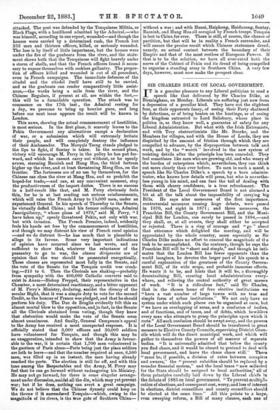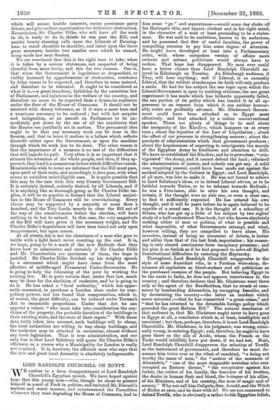SIR CHARLES DILKE ON LOCAL GOVERNMENT.
IT is a genuine pleasure to any Liberal politician to read a speech like that delivered by Sir Charles Dilke, at Birmingham, on Monday. Liberals are suffering just now from a depression of a peculiar kind. They have not the slightest fear, as their opponents fancy, of seeing their Party shattered by defections, or of being beaten on the hustings, or of seeing the kingdom entrusted to Lord Salisbury, whose place in politics is, as they know well, a guarantee of safety for any Liberal Administration. But what with the Irish Extremists, and with Tory obstructionists like Mr. Bourke, and the Members for villages, and with the House of Lords, they are dispirited by the amount of friction through which they are compelled to advance, by the disproportion between talk and work, and by the " worrit " involved in the new system of resisting details after the principle has been conceded. They feel sometimes like men who are growing old, and who weary of the burden of enterprises which, nevertheless, they can think out more clearly than ever before. To men in such a mood, a speech like Sir Charles Dllke's, a speech by a born adminis- trator, who knows how details will press, but who is neverthe- less young in his mind, and can face the toil of dealing with them with cheery confidence, is a true refreshment.- The President of the Local Government Board is not alarmed a bit at all the talk about the impossibility of carrying big Bills. He says nine measures of the first importance, controversial measures rousing huge debate, were passed in 1870, and eight in 1871 ; and three measures, the Franchise Bill, the County Government Bill, and the Muni- cipal Bill for London, can surely be passed in 1884,—and they shall, or, at all events, they shall either be accepted or rejected. There is a ring of courage and " go " about that utterance which delighted the meeting, and will be appreciated by the whole country, more especially as Sir Charles Dilke makes no effort to conceal the magnitude of tie task to be accomplished. On the contrary, though he says the Franchise Bill will be "short and simple," and though he inti- mates that the London Bill has fewer opponents than the world imagines, he devotes the larger past of his speech to a careful explanation of the greatness of the County Govern- ment Bill, of its wide scope, and probable immense effects. He wants it to be, and hints that it will be, a thoroughly decentralising Bill, creating local administrations every- where, and relieving the central authority of great masses of work. " It is a ridiculous fact," said Sir Charles, that in the chosen home of free elective institutions we "have a vast number of large towns with no true and simple form of urban institutions." We not only have no system under which such places can be organised at once, but "we have an overlapping of areas, and a confusion of bodies, and of functions, and of taxes, and of debts, which bewilders every man who attempts to grasp the principles upon which it rests." All such confusion should be swept away, and the powers of the Local Government Board should be transferred in great measure to Elective County Councils, supervising District Coun- cils which will do the direct municipal work, and which will gather to themselves the powers of all manner of separate bodies. "It is universally admitted that below the county you find chaos, and it would be absurd to pretend to deal with local government, and leave the chaos chaos still." There "must be, if possible, a division of rates between occupiers and owners," the "present subsidies should be replaced by a sounder financial system," and the local taxes "now oollected for the State should be assigned to local authorities," all of them principles carefully laid down by the Liberal chiefs in the debate of 1883 on local government. "To prevent mnitipli. cation of elections, and consequent cost, worry, and loss of interest in elections, district councillors and county councillors should be elected at the same time." All this points to a large, even sweeping reform, a Bill of many clauses, each one of -which will arouse hostile interests, excite passionate party debate, and give endless opportunities for deliberate obstruction. Nevertheless, Sir Charles Mike, who will have all the work to do, is ready to do it, thinks he can pass the Bill, and amidst hearty cheering calls upon the Liberals of Birming- ham to stand shoulder to shoulder, and insist upon the three great measures, besides two smaller ones which he named, being made law next Session.
We are convinced that this is the right tone to take, when it is taken by a serious statesman, not suspected of being cheerful from mere levity, and this for two reasons. One is, that when the Government is lugubrious or despondent, or visibly harassed by apprehensions of obstruction, resistance by delay comes to be expected, and therefore to seem natural, and therefore to be tolerated. It ought to be considered as what it is,—a great treachery, forbidden by the unwritten law of Parliament, and injurious to the welfare of the country, and therefore no more to be expected than a dynamite explosion under the floor of the House of Commons. It should not be received with dreary tolerance, as if it were a mere bore and a weariness necessary to be endured ; but with hot surprise and indignation, as an assault on Parliament to be im- mediately put down by the use of all the machinery that the Houses can justifiably set in motion. The permanent idea ought to be that any necessary work can be done in the Session, and that to leave it undone is a failure which reflects discredit either upon the Government, or upon the machine through which its work has to be done. The other reason is that the importance of a measure is no test of the difficulties that will impede its path. Very often it is so important that it attracts the attention of the whole people, and then, if they ap- prove it, they lend it a momentum before which difficulties vanish. Members who wish to resist are informed that the Bill must pass, upon peril of their seats, and accordingly it does pass, with what seems to outsiders unintelligible ease. It is quite possible that this may be the case with this very County Government Bill. It is certainly desired, ardently desired, by all Liberals, and if it is anything like as thorough-going as Sir Charles Dilke im- plies, it will be so popular in Ireland that the Liberal majori- ties in the House of Commons will be overwhelming. Every clause may be supported by a majority of more than a hundred, and the Tory Lords, merely to clear the Bill out-of the way of the constituencies before the election, will have nothing to do but to submit. In this case, the very magnitude of the Bill will have given it the necessary weight, and Sir Charles Dunce's hopefulness will have been based not only upon temperament, but upon reason.
At all events, his is not the cheeriness of a man who goes to battle with a light heart, never counting up the cost. It is, we hope, going to be a mark of the new Radicals that they know how to administer, and certainly if Sir Charles Dilke and Mr. Chamberlain are specimens of them, the hope is justified. Sir Charles Dilke finished up his weighty speech by a statement which might have come from the most effective of middle-aged Permanent Under-Secretaries. He is going to help the rehousing of the poor by working the existing law. He is quite certain that, under that law, much may be done for the abolition of rookeries, and he is going to do it. He has asked a "local authority," which has appar- ently consented, to purchase a London slum under its com- pulsory powers, and has found that compensation, which is, of course, the great difficulty, can be reduced under Torrens's Act to reasonable proportions. Under that Act he can appoint a valuer, "who must take into consideration the con- dition of the property, the probable duration of the buildings in their existing state, and the state of their repair." With those data fairly taken into account, such buildings will be cheap, the local authorities are willing to buy cheap buildings, and the rookeries may be attacked in succession, almost without any fresh legislation. That is true administration, and our only fear is that Lord Salisbury will quote Sir Charles Mike's efficiency as a reason why a Municipality for London is really not required. It is, however, the efficient man who says that the new and great local Assembly is absolutely indispensable.







































 Previous page
Previous page